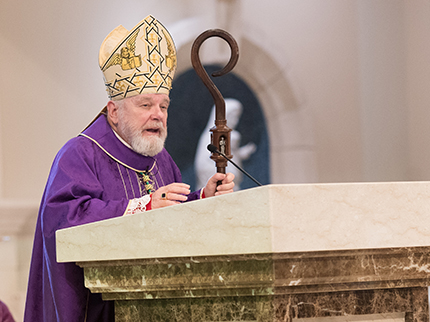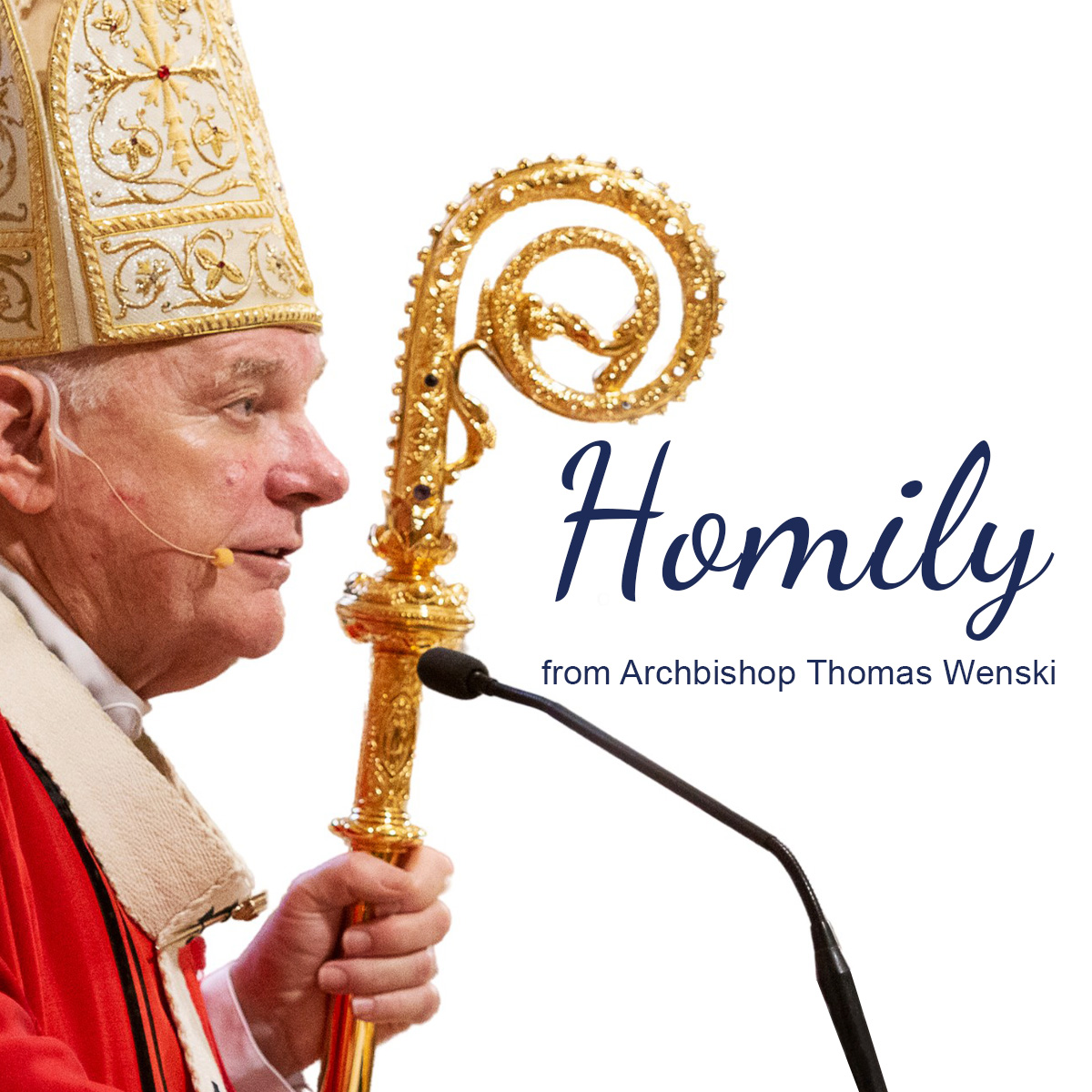By Archbishop Thomas Wenski - The Archdiocese of Miami
Archbishop Thomas Wenski preached this homily at the Eucharistic Revival Summit held March 16, 2024, at St. Gregory the Great Church in Plantation.
Thank you for being here today at this Eucharistic Revival Summit — and for your work in your parishes to promote Eucharistic Revival. “We want to see Jesus” some Greeks said to Philip and they in turn took them to Jesus. In your role in supporting this Eucharistic Revival, you are also helping to bring people to Jesus. Of course, today we don’t see Jesus “in the flesh” but we do encounter him in his flesh and blood hidden under the sacramental signs of bread and wine.
Today’s Gospel from John gives us Jesus’ last public words before he was to undergo his passion. These were not Jesus’ “last words” but his last words to the crowds, but they do point to and help us understand his last words at the Last Supper and from the Cross. Jesus is the grain of wheat that dies so as to produce new life.

Photographer: TOM TRACY | FC
Archbishop Thomas Wenski preached this homily at the Eucharistic Revival Summit held March 16, 2024, at St. Gregory the Great Church in Plantation.
In the first reading, the prophet speaks of a new covenant and that new covenant is what is given to us at the Last Supper and continues for all time “in memory of him” at every Mass. Eucharist means thanksgiving and it is the highest prayer we can offer as Catholics, for our participation in the Eucharist, which re-presents for us the saving sacrifice of Jesus on the Cross for the salvation of the world, is the “source and the summit” of our Christian lives. The Sacrifice of the Cross was Jesus’ gift of himself to the Father for us — to save us. And in the Mass that same sacrifice offered on the Cross in a bloody manner is re-presented in an unbloody manner so that in our communion in his Body and Blood we might have the strength to make gifts of ourselves to the Father and to one another.
As you know, part of our Eucharistic Revival this year is the Eucharistic Congress in Indianapolis in July 2024. They expect some 80,000 people to gather where the Indianapolis 500 takes place. I hope some of you will be there — along with me.
The Eucharistic Revival is meant to renew, strengthen, and help us better articulate our faith in the Real Presence of Jesus Christ in whose Body and Blood we have communion.
I know many bishops were disconcerted by the results of the Pew study which suggested a majority of Catholics do not believe in the real presence of Jesus in the Blessed Sacrament. The result of polls often times depends on how the questions are asked; and who is asked. I think if this poll were asked only of Catholics who regularly attend Mass, most would profess belief in the Real Presence. Some may not be able to articulate their belief in words, but they do believe. As I told a few bishops, the reason people go to Mass is for the Eucharist – they are certainly not going for the homilies.
God once fed the Hebrews who wandered in the desert in search of the Promised Land with manna. God continues to feed his people with the holy Eucharist, food to strengthen us on our pilgrim journey through this “vale of tears.”
Faith comes through hearing — not through sight, nor taste nor touch. We worship Jesus – because he is True God as well as being True Man. On the cross Jesus’ divinity was hidden. His dying proved his humanity only too well, his rising from the dead would prove his divinity. In the Eucharist, the real presence of Jesus — body and blood, soul, and divinity — is hidden beneath appearances of bread and wine. Sight, touch, taste all fail us; hearing suffices to believe. For if Jesus has told us, it is so; it is so, for he can neither deceive nor be deceived.
And while there are accounts of hosts bleeding, these accounts may sometimes be helpful to increase our piety, but they are not necessary for us to believe. We remember the words of Jesus to Thomas: Blessed are those who have not seen yet believe.
There’s the story of a woman who brought her young child to church, and with the child in tow knelt before the Blessed Sacrament in prayer. She told the child: “See that red light next to the tabernacle. That light tells us that Jesus is present in the tabernacle — so let us pray a while to him.”
The mother lost herself in prayer and so the child pulled on her skirt and said: “Mommy, when the light turns green, can we go then?”
Our participation at Mass — and our reception of Holy Communion — is not something private. Holy Communion is not just about “me and Jesus.” We were baptized so that we could participate in the eucharistic banquet – and this banquet is a foretaste of the Eternal banquet of heaven when God will seat us at table with himself. But we receive Communion so that becoming whom we receive we go out into the world to witness to the Gospel by sharing with the world what we have received. Having received the Body of Christ, we are the Body of Christ, the Christ who brought sight to the blind, who made the lame walk and who fed the hungry thousands.
The Mass is ended. Ita Missa est. But perhaps a better translation would be, go, it is the sending. Nourished by the Eucharist and instructed by the Word of God, we are sent to heal the broken-hearted, to set captives free. The Eucharist, Holy Communion, the Blessed Sacrament commits us to service.

